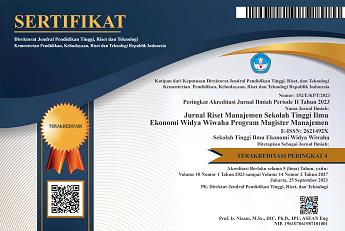ANALISA NIAT MITRA PENJUAL UNTUK MENGGUNAKAN APLIKASI PENGIRIMAN MAKANAN SECARA DARING
DOI:
https://doi.org/10.32477/jrm.v10i1.461Keywords:
Performance expectancy, Effort expectancy, Social influence, Price value, TrustAbstract
The presence of new variant of the covid 19 Omicron virus will certainly leads to the public alert. In order to prevent transmission, the government recommends that people should reduce direct interactions between individuals. This condition is an opportunity for companies providing Online Food Delivery Applications (OFDA) to take benefit from increased transactions which occur during COVID-19 pandemic. Currently, research on OFDA is still focused on OFDA consumers as a research’s Objects. On the other hand, the OFDA provider companies benefit from the profit sharing provided by food and beverage sellers who sell their products at APMSD. The results of this research are believed to be able to help APMSD companies in developing effective marketing strategies in order to attract sales partners to continue using OFDA. This research uses five independent variables, namely performance expectancy, effort expectancy, social influence, trust and price value. Data processing using SPSS application involving sample size of 158 respondents. This study reveals that social influence, trust and price value have a positive significant effect on intention to use OFDA. While two other independent namely Performance expectancy, Effort expectancy does not have significant influence to the dependent variable.
References
Agustini.P. (2021). Warganet Meningkat, Indonesia Perlu Tingkatkan Nilai Budaya di Internet. Aptika Kominfo, 9–10.
Alalwan, A. A. (2020). Mobile food ordering apps: An empirical study of the factors affecting customer e-satisfaction and continued intention to reuse. International Journal of Information Management, 50, 28–44. https://doi.org/10.1016/j.ijinfomgt.2019.04.008
Amalia, Q. (2021). Persepsi Konsumen Terhadap Faktor yang mempengaruhi Niat Menggunakan aplikasi Go-Food di Masa Pandemi COVID-19. Industrial Research Workshop and National Seminar, 4–5. https://jurnal.polban.ac.id/ojs-3.1.2/proceeding/article/view/2841/2220
Cho, M., Bonn, M. A., & Li, J. (Justin). (2019). Differences in perceptions about food delivery apps between single-person and multi-person households. International Journal of Hospitality Management, 77(June), 108–116. https://doi.org/10.1016/j.ijhm.2018.06.019
Fahlevi. (2021). Analisa Niat Penggunaan Aplikasi Mobile Banking Oleh Nasabah Perbankan Pada Masa Pandemi Covid 19. XII (2), 167–177.
Gunden, N., Morosan, C., & DeFranco, A. (2020). Consumers’ intentions to use online food delivery systems in the USA. International Journal of Contemporary Hospitality Management, 32(3), 1325–1345. https://doi.org/10.1108/IJCHM-06-2019-0595
Hair, et al. 2019. Multivariate Data Analysis eighth edition. New Jersey: Prentice Hall
Hidayat, E. P., & Paramita, E. L. (2021). Pengaruh Persepsi Keinformatifan, Harga, Kegunaan, Dan Kemudahan Penggunaan Terhadap Minat Pembelian Ulang Konsumen Go-Food. E-Jurnal Manajemen Universitas Udayana, 10(8), 820. https://doi.org/10.24843/ejmunud.2021.v10.i08.p05
Iisnawatia, Rosa, A., Yunita, D., & Hartati. (2019). Keputusan Konsumen Menggunakan Jasa Pesan Antar Makanan Online di Palembang. Jurnal Manajemen Dan Bisnis Sriwijaya, 17(3), 147–157.
Kwateng, Kwame Owusu, Kenneth Afo Osei Atiemo, and Charity Appiah. (2018). "Acceptance and use of mobile banking: an application of UTAUT2." Journal of enterprise information management.
Novana, K., Hadining, A. F., & Sari, R. P. (2021). Analisis Faktor Eksternal Yang Mempengaruhi Niat Penggunaan Aplikasi Pengiriman Makanan Pada Mahasiswa Universitas Singaperbangsa Karawang. Jurnal Ilmiah Ekonomi Bisnis, 26(1), 54–68. https://doi.org/10.35760/eb.2021.v26i1.3135
Okumus, B., Ali, F., Bilgihan, A., & Ozturk, A. B. (2018). Psychological factors influencing customers’ acceptance of smartphone diet apps when ordering food at restaurants. International Journal of Hospitality Management, 72, 67–77. https://doi.org/10.1016/J.IJHM.2018.01.001
Pigatto, G., Machado, J. G. de C. F., Negreti, A. dos S., & Machado, L. M. (2017). Have you chosen your request? Analysis of online food delivery companies in Brazil. British Food Journal, 119(3), 639–657. https://doi.org/10.1108/BFJ-05-2016-0207.
Putri, N. S., Gunawan, J., & Wibawa, B. M. (2021). Identifikasi Faktor yang Mempengaruhi Niat Keberlanjutan Penggunaan Layanan Online Food Delivery di Masa Pandemi Covid-19. Jurnal Sains dan Seni ITS, 10(1), D89-D94.
Sekaran, U., & Bougie, R. (2016). Research methods for business: A skill building approach. John Wiley and Sons
Shareef, M. A., Baabdullah, A., Dutta, S., Kumar, V., & Dwivedi, Y. K. (2018). Consumer adoption of mobile banking services: An empirical examination of factors according to adoption stages. Journal of Retailing and Consumer Services, 43, 54–67. https://doi.org/10.1016/J.JRETCONSER.2018.03.003
Sharma, S. K., & Sharma, M. (2019). Examining the role of trust and quality dimensions in the actual usage of mobile banking services: An empirical investigation. International Journal of Information Management, 44, 65–75. https://doi.org/10.1016/J.IJINFOMGT.2018.09.013
Shaw, N., & Sergueeva, K. (2019). The non-monetary benefits of mobile commerce: Extending UTAUT2 with perceived value. International Journal of Information Management, 45, 44–55. https://doi.org/10.1016/J.IJINFOMGT.2018.10.024
Tamilmani, K., Rana, N. P., Prakasam, N., & Dwivedi, Y. K. (2019). The battle of Brain vs. Heart: A literature review and meta-analysis of “hedonic motivation” used in UTAUT2. International Journal of Information Management, 46, 222–235. https://doi.org/10.1016/J.IJINFOMGT.2019.01.008
Troise, C., O’Driscoll, A., Tani, M., & Prisco, A. (2021). Online food delivery services and behavioural intention – a test of an integrated TAM and TPB framework. British Food Journal, 123(2), 664–683. https://doi.org/10.1108/BFJ-05-2020-0418.
Venkatesh, Viswanath, Michael G. Morris, Gordon B. Davis, and Fred D. Davis. (2003). “User Acceptance of Information Technology: Toward a Unified View.” MIS Quarterly 27, no. 3: 425-478. doi:10.2307/30036540
Venkatesh, V., Thong, J.Y. and Xu, X. (2012), “Consumer acceptance and use of information technology: extending the unified theory of acceptance and use of technology”, MIS Quarterly, Vol. 36 No. 1, pp. 157-178.
Verkijika, S. F. (2018). Factors influencing the adoption of mobile commerce applications in Cameroon. Telematics and Informatics, 35(6), 1665–1674. https://doi.org/10.1016/J.TELE.2018.04.012
Downloads
Published
Issue
Section
License
Copyright (c) 2023 Renza Fahlevi

This work is licensed under a Creative Commons Attribution-ShareAlike 4.0 International License.









